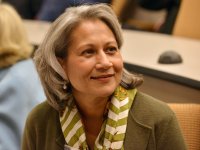Reflecting on Yourself as a Leader
Schools need leaders who don’t yet think they are leaders and those of us teachers who are apprehensive about embracing the roles and responsibilities of leadership.
It took me a long, long time to accept the notion that as a teacher, I was also a leader; that as a department chair, I was also a leader; and that as a coach, I was also a leader. This was because I was operating within traditional definitions of leadership: I didn't have a formal leadership title -- like principal -- nor did I have any kind of certificate or degree granting me the role and responsibilities.
But I was a leader -- for my students and for my colleagues -- because leadership has much more to do with how we think about what we do and why than it does about formal titles and degrees. And I imagine that many of you are also leaders whether you're aware of it or not.
Formal and Informal Leadership
Informal leadership is present and essential in all organizations, and informal leadership can be conducive to a school's health and effectiveness, or destructive. Think about your school: Whose thoughts and opinions are most respected and listened to amongst staff? In addition to those in positional leadership roles (the administrators), who else influences staff? Who has a loud voice? Who is respected? Who is feared?
Now think about yourself as a leader. Does the suggestion that you are a leader excite you or scare you? What does it mean to you to be a leader? What might be possible if you thought of yourself as a leader?
I'd like to suggest that in order to transform our schools, we'll need many, many more leaders. We'll need the leaders who don't yet think they are leaders and those of us who are apprehensive about embracing the roles and responsibilities of leadership, and we'll need to have reflected deeply on what we mean by leadership and on who we are as leaders. Towards that end, I'd like to offer you some prompts.
Transformation Starts with Self-Awareness
In my new book, The Art of Coaching Teams, I suggest that to develop healthy teams of educators who can do the hard work of transforming schools, we must start with ourselves as team leaders. We can't tackle unhealthy team dynamics or unfocused meetings until we know who we are as leaders and until we've explored our beliefs around power.
The first area for us to reflect on is around models of leadership in our society. Here are some questions from my book that can support this reflection:
- Who is a leader you admire?
- Who are the leaders in your community, city, and country?
- What kind of leadership do they demonstrate?
- How did they come to be leaders? Can you relate to them?
- What do you think makes a good leader?
- What kind of leader do you aspire to be?
Very few societies have shared agreements about what constitutes good leadership. Depending on your beliefs and values, a good leader might listen to all voices and take them into account when making a decision; or a good leader might consult with a few trusted advisors and then make a decision; or a good leader might make a decision alone based on his or her expert knowledge and experience.
Team leaders can benefit from exploring the big philosophical questions that surround the definition of good leadership. When we are aware of our core values, beliefs, dispositions, preferences, and histories, we can make conscious choices about our leadership stance.
What's Your Leadership Style?
Who you are as a leader is the next big area to explore. Here are some of the questions I offer to guide in this exploration:
- Who held power in your family when you were growing up? What kind of power was that? What was it based on?
- What were you taught about authority in your childhood home? What granted someone authority?
- Why do you lead in the way you do?
- What assumptions are you acting on as a leader about yourself, your team, and the work to be done?
- How does the system in which you are operating impact who you are as a leader?
- How do you negotiate power dynamics as a leader? Where do you notice power playing a role in your leadership?
- What kind of leader do you aspire to be? How do you want others to see you?
- What kind of leader does your team need you to be?
- What kind of leader does the community you serve need you to be?
Leadership is complex and contextual. Our circumstances heavily influence who we are and can be as leaders. In order to understand the complexity, we will all benefit from spending some reflective time considering our backgrounds, beliefs, and actions.
This reflection can help us embrace ourselves as leaders, refine our skill set, and create the change we hope to see in our schools.
